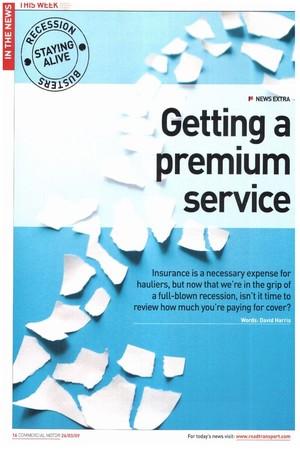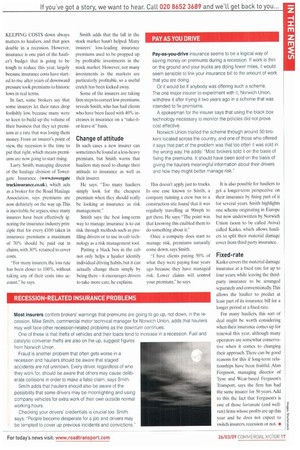Getting a premium service
Page 16

Page 17

If you've noticed an error in this article please click here to report it so we can fix it.
Insurance is a necessary expense for hauliers, but now that we're in the grip of a full-blown recession, isn't it time to review how much you're paying for cover?
KEEPING COSTS down always matters to hauliers. and that goes double in a recession. However, insurance is one part of the haulier's budget that is going to be tough to reduce this year, largely because insurance costs have started to rise after years of downward pressure took premiums to historic lows in real terms.
In fact, some brokers say that some insurers let their rates drop foolishly low, because many were so keen to build up the volume of their business that they set premiums at a rate that was losing them money. From an insurer's point of view, the recession is the time to put that right, which means premiums are now going to start rising.
Larry Smith, managing director of the haulage division of Towergate Insurance (www.towergate truckinsurance.co.uk), which acts as a broker for the Road Haulage Association, says premiums are now definitely on the way up. This is inevitable, he argues, since many insurers have been effectively ignoring the insurance industry principle that for every £100 taken in insurance premiums a maximum of 70% should be paid out in claims, with 30% retained to cover costs.
"For many insurers, the loss rate has been closer to 100%, without taking any of their costs into account." he says. Smith adds that the fall in the stock market hasn't helped. Many insurers' loss-leading insurance premiums used to be propped up by profitable investments in the stock market. However, not many investments in the markets are particularly profitable, so a useful crutch has been kicked away.
Some of the insurers are taking firm steps to correct low premiums, reveals Smith, who has had clients who have been faced with 40% increases in insurance on a "take-itor-leave-itbasis.
Change of attitude
In such eases a new insurer can sometimes be found at a less-heavy premium. but Smith warns that hauliers may need to change their attitude to insurance as well as their insurer.
He says: "Too many hauliers simply look for the cheapest premium when they should really be looking at insurance as risk management."
Smith says the best long-term way to manage insurance is to cut risk through methods such as profiling drivers or to use in-cab technology as a risk management tool.
Putting a black box in the cab not only helps a haulier identify individual driving habits, but it can actually change them simply by being there — it encourages drivers to take more care, he explains. This doesn't apply just to trucks. In one case known to Smith. a company running a crew bus to a construction site found that it was regularly travelling at 90mph to get there. He says: "The point was that knowing this enabled them to do something about it."
Once a company does start to manage risk, premiums naturally come down, says Smith.
"I have clients paying 50% of what they were paying four years ago because they have managed risk. Lower claims will control your premium," he says. It is also possible for hauliers to get a longer-term perspective on their insurance by fixing part of it for several years. Smith highlights one scheme originating in Europe but now underwritten by Norwich Union (soon to be called Aviva) called Kasko, which allows hauliers to split their material damage cover from third party insurance.
Fixed-rate
Kasko covers the material damage insurance at a fixed rate for up to four years, while leaving the thirdparty insurance to be arranged separately and conventionally.This allows the haulier to predict at least part of its insurance bill for a longer period at a fixed rate.
For many hauliers, this sort of deal might be worth considering when their insurance comes up for renewal this year. although many operators are somewhat conservative when it comes to changing their approach. There can be good reasons for this if long-term relationships have been fruitful. Alan Ferguson, managing director of 'Lytle and Wear-based Ferguson's Transport. says the firm has had the same insurer for 50 years. Add to this the fact that Ferguson's is one of those fortunate (and wellrun) firms whose profits are up this year and he does not expect to switch insurers, recession or not. •












































































































































